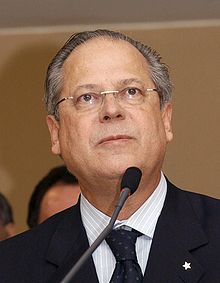José Dirceu
| José Dirceu | |
|---|---|
 |
|
| 39th Chief of Staff of the Presidency | |
|
In office January 1, 2003 – June 21, 2005 |
|
| President | Luiz Inácio Lula da Silva |
| Preceded by | Pedro Parente |
| Succeeded by | Dilma Rousseff |
| Personal details | |
| Born |
José Dirceu de Oliveira e Silva March 16, 1946 Passa Quatro, Brazil |
| Nationality | Brazilian |
| Political party | Workers' Party |
José Dirceu (Portuguese pronunciation: [ʒoˈzɛ dʒiʁˈsew]; b. Passa Quatro, Minas Gerais, March 16, 1946), in full José Dirceu de Oliveira e Silva, is a former Brazilian politician. He has had his political rights suspended by the Brazilian House of Representatives and has been found guilty on charges of active corruption and conspiracy in two separate lawsuits judged by the Brazilian Supreme Court.
He participated in a revolutionary armed group following the Brazilian military coup of 1964, and was exiled in 1969. He returned in 1980 and was active politically, his highest post was as the chief-of-staff to Luiz Inácio Lula da Silva's administration from 2003 to 2005, when he resigned due to corruption charges.
Dirceu moved to São Paulo in 1961 and began his militancy by joining the "Ala Marighella" (later called the ALN) in 1966, a revolutionary armed group linked to the Brazilian Communist Party. In 1968 Dirceu, who was known as "Daniel", was the leader of the State Union of Students or UEE. As a consequence of his militancy in the student movement, Dirceu was arrested on October 12, 1968, during the 30th Congress of the National Student Union (UNE), in Ibiúna.
In 1969 the Marxist revolutionary groups MR8 and ALN abducted the US ambassador to Brazil Charles Burke Elbrick. The revolutionaries demanded the liberation of fifteen prisoners, including José Dirceu. This incident is the basis of the film Four Days in September.
After that he travelled to Cuba. While in exile, Dirceu worked, got military training and studied in the island. According to him, he changed his appearance through plastic surgery. Dirceu returned to Brazil in 1975 with the false name of "Carlos Henrique Gouveia de Mello". He married his first wife and lived in Paraná in total secrecy, with his true identity unbeknownst even to his wife, until 1979, when he returned to Cuba.
...
Wikipedia
